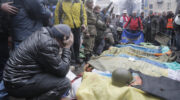Justice Europe
With one video, Russia’s Chechnya problem seizes the spotlight again
| View caption Hide caption
In theory, Russian law applies everywhere within Russia’s borders. But over and over, the Chechen republic proves exempt from those rules, no matter how blatant a violation might be.
Russia’s military devastated and pacified Chechnya, and the Russian government expended vast subsidies to reconstruct Chechnya’s war-ravaged cities. But Moscow did little to reintegrate the republic with Russia’s constitutional order, and instead left Chechnya in the hands of a leader who swore fealty to Russia but otherwise had a free hand to run the republic as he wished.
The result is a maze of contradictions, a statelet where Russian law is openly flouted and the official ideology is at odds with the Russian constitution. Yet it is one of the most Kremlin-loyal regions in Russia, and has sent thousands of volunteers to fight alongside Russian troops in the war against Ukraine.
“The regime installed in Chechnya was intended to establish peace and insure Moscow’s control,” says Andrei Kolesnikov, a Carnegie expert who continues to live and work in Russia.
But very quickly it became more of a feudal system in which Mr. Kadyrov enjoys absolute personal power, Chechen clans are his vassals, and his rule is enforced by brutal methods, Mr. Kolesnikov adds. Mr. Kadyrov repays Russian President Vladimir Putin for Moscow’s lavish subsidies with total loyalty. “The tasks set by Putin were solved by such methods, and he was satisfied. Kadyrov demonstrates absolute loyalty, and that is why he is permitted more than the heads of other regions.”
Oleg Orlov, chairman of the now-banned Memorial human rights center, says the odd relationship of Chechnya to Russia is not an accident, but part of Mr. Putin’s design for governing his huge, fractious country.
“At some point I thought Chechnya was a tiger that had escaped from the Kremlin’s control,” he says. “But then I realized that it’s part of Putin’s system of balances and counter-balances. Even if the situation with Chechnya is bad for Russia, it’s good for Putin.”
But it comes at the price of constant embarrassment, as inner-Chechen reality and Mr. Kadyrov’s wayward behavior repeatedly underlines the difficult and disconnected nature of Chechnya’s place within the Russian Federation.
“Chechnya is a separate state”
After Mr. Kadyrov posted the video of his son beating an incarcerated man, Kremlin spokesman Dmitry Peskov opened his daily briefing with a shrug: “I will say from the start, I will not comment on the story about Kadyrov’s son,” he said. “I don’t want to.”
Mr. Orlov says the Kremlin faces a dilemma. “It’s not the first time Kadyrov has put the Kremlin in a stupid situation. They can neither support nor condemn him. Peskov’s reaction shows they are at a loss for what to do.”
Many other Russian politicians and thought leaders offered what was, for many, unusual expressions of outrage. “This is a challenge to Russia’s whole legal system. They have shown that they can commit crimes and nothing will happen to them,” said Eva Merkacheva, a member of Russia’s Presidential Human Rights Council.
The abused prisoner was a Russian man, Nikita Zhuravel, from Volgograd, a city far from Chechnya. Last May, Mr. Zhuravel was charged with “insulting the feelings of religious believers” by allegedly burning a Koran outside of a mosque at the behest of Ukrainian intelligence services, it was claimed.
The alleged crime was local, but Russia’s Investigative Committee used strained reasoning to transfer the incarcerated man to Chechnya for “further investigation.” How Mr. Kadyrov’s son happened to gain access to the prisoner, and given the opportunity to beat him, has not been explained.
“For Russian intellectuals it emphasizes that Chechnya is a separate state, outside the laws of Russia,” says Grigory Shvedov, editor of Caucasian Knot, an independent online news site that covers the Caucasian region. “Ordinary Russians usually don’t think about Chechnya, or care whether it recognizes Russian law. But this case draws attention, because it shows that any regular Russian person could be sent to Chechnya and end up a similar situation. … This person, Zhuravel, might be innocent, just a victim, but he was just taken to Grozny and treated in such a way.”
Even many Chechens appear to have been shocked by the arbitrary violence depicted in the video, Mr. Kadyrov’s declared pride in his son’s actions, and the absolute impunity it suggests. Chechnya’s state TV channel posted a survey on its Telegram channel last week asking viewers how they react to the younger Kadyrov’s actions. The first wave of responses showed 84% took it negatively, and even after the results began to shift, 55% were still condemning it a full day later.
Despite such embarrassments, some analysts say the Chechnya model has been a success for the Kremlin, one that perhaps holds implications for the final outcome of the ongoing war in Ukraine. It took a long time to subdue Chechnya, the human costs were horrific, and the expense of rebuilding it exorbitant. Yet the long-term result is a territory under reliable control, with a pacified population and a loyal leader.
“The Chechnya model not only looks like a success from Moscow’s point of view,” says Mr. Shvedov. “It comes down to the question of price: Was it worth it? And it looks like the answer is yes, that’s a price [the Kremlin is] willing to pay.”




